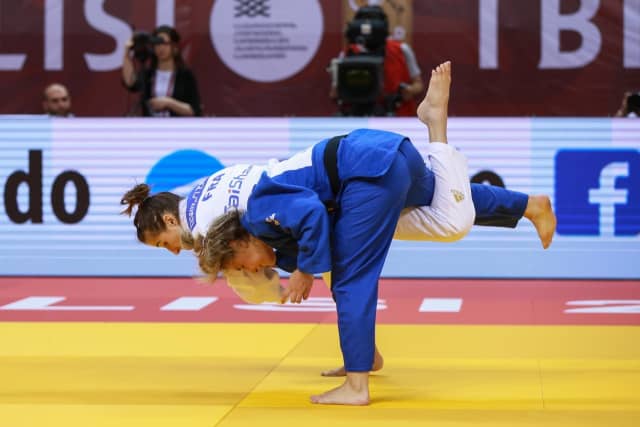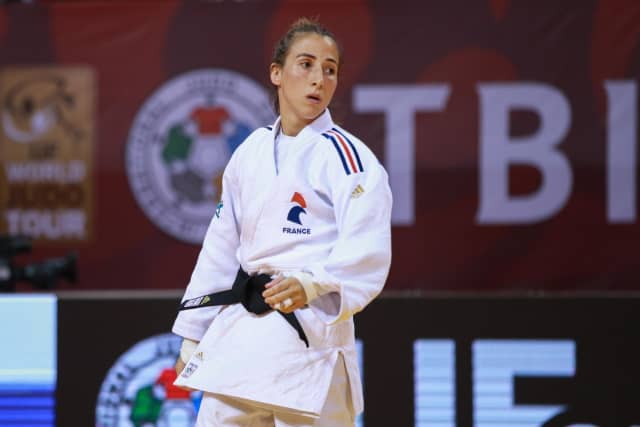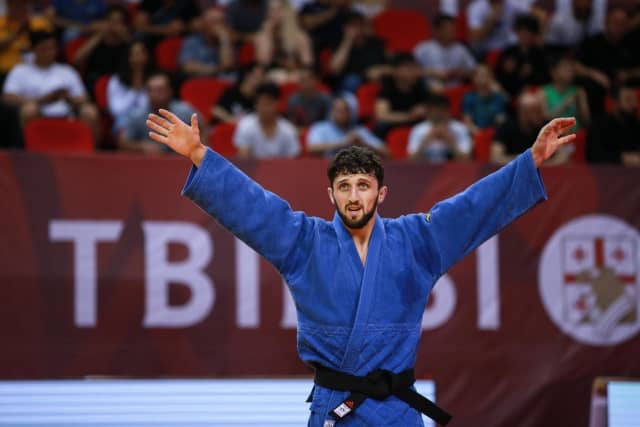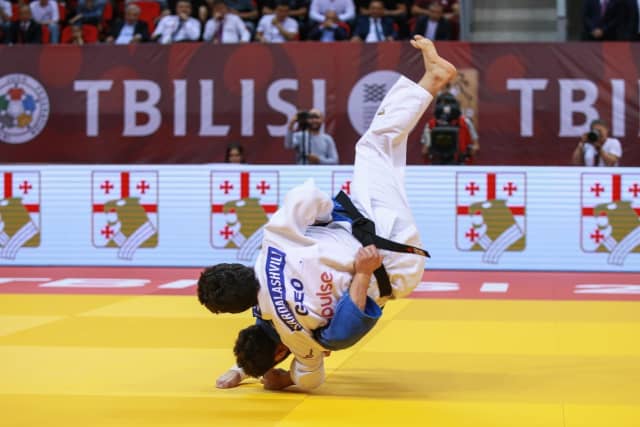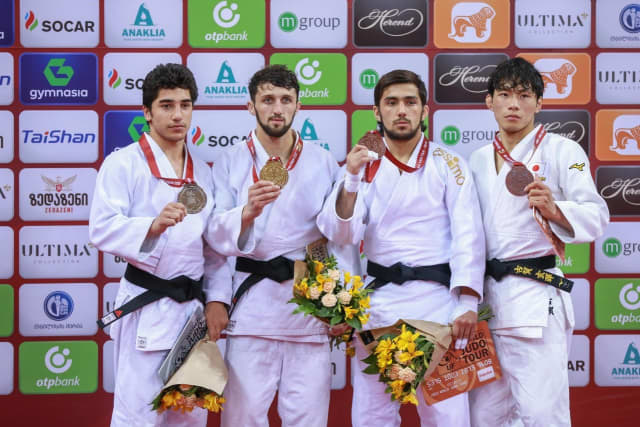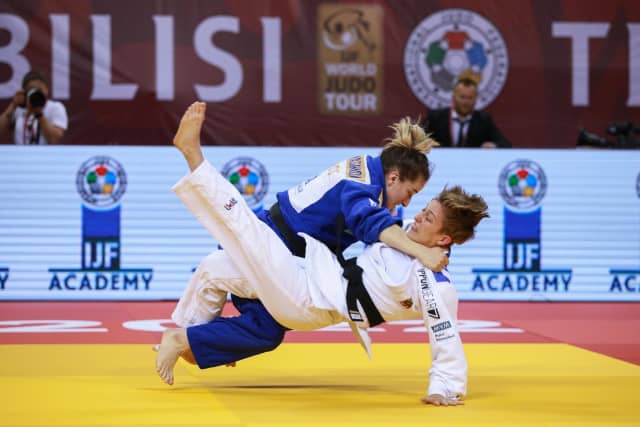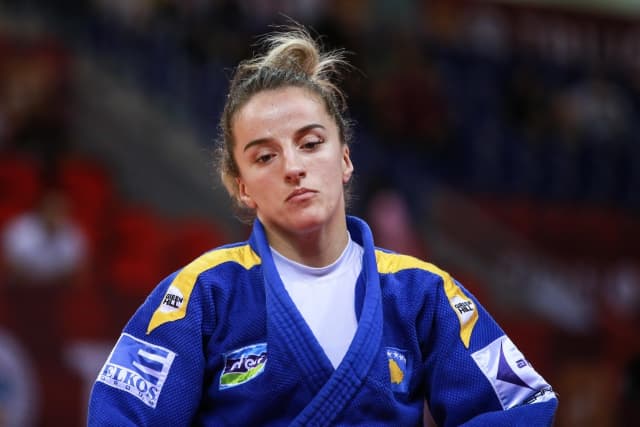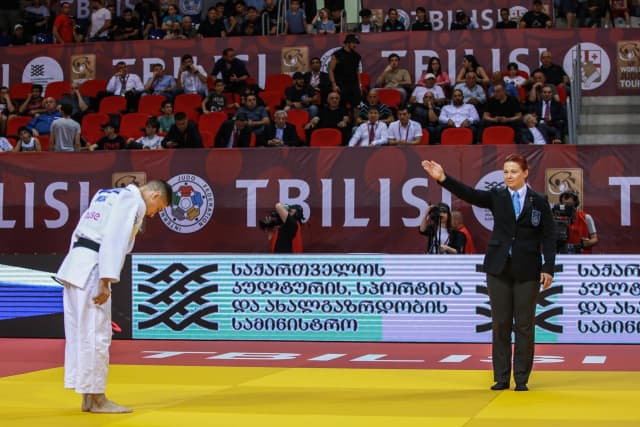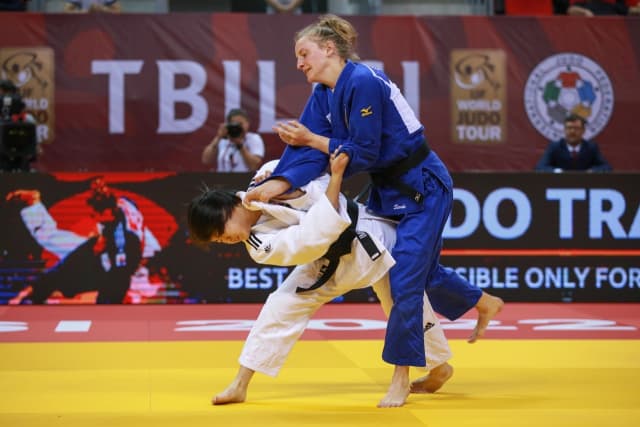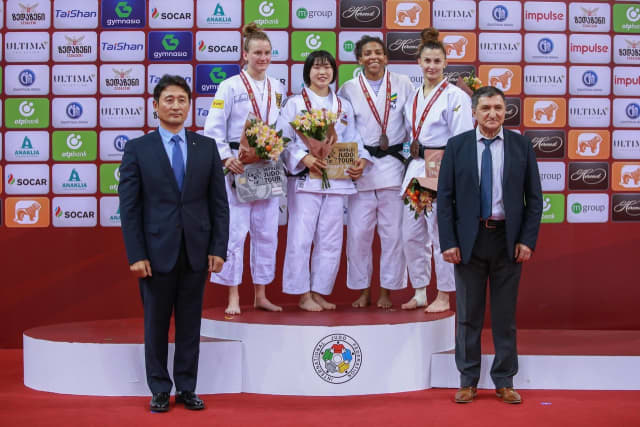-48kg The French Touch
If there were doubts, because surprises often occur, the two favourites cleared them up with ippon. Top seed Mélanie Legoux-Clément (FRA) has experience to dish out but at thirty years old she is not quite as regular as she should be and feels the pressure, already evident, from the new generations. The French judoka could not improve, or even match, the bronze medal obtained at the Abu Dhabi Grand Slam last year. Georgia was the opportunity to recover sensations and claim the right of the elders to continue winning.
Laura Martínez Abelenda (ESP) is the perfect example of those promises that have come together and have reached the elite level, to stay. She has also had a delicate period with results that did not correspond to her quality and potential. Tbilisi has served her well with a step up on to the train of success, the one that is reserved for medallists. It was written that they would face each other in the final, but they had to go above the rest, especially in the semi-finals. The French got rid of the Brazilian Amanda Lima and the Spanish eliminated the Dutch Amber Gersjes. It was not a beautiful final. Legoux Clément took the initiative at all times and the Spaniard was promptly penalised with two shido. The third fell a few seconds from the golden score. Legoux Clément straightened out her career with a providential gold and Martínez Abelenda, in addition to the silver, added points necessary for the Olympic race that begins in three weeks.
The first bronze medal was a European duel between the Austrian Katharina Tanzer and the Dutch Amber Gersjes, with victory for the former with an ippon after six minutes of golden score. The second was settled between the French Blandine Pont and the Brazilian Amanda Lima. Pont won by hansoku make.
Final (-48 kg)
Bronze Medal Fights (-48 kg)
Final Results (-48 kg)

-60kg The Party
There were four Georgians, the privilege of the organising country. As the locals have a lot of depth on the bench, especially in the light categories, they did not disappoint. We already said that they go out with the knife between their teeth. Three of the four reached the semi-finals and the stone guest, Rovshan Aliyev (AZE), made the mistake of letting his guard down and was eliminated by Temur Nozadze nine seconds from golden score. It must be said that Nozadze had a day to frame by eliminating the Italian Petrosino and especially the Japanese, Koga, in a spectacular match. Nozadze's rival came out of the semi-final between Lukhumi Chkhvimiani and Giorgi Sardalashvili and here too there was good judo and drama. Sardalashvili parried a Chkhvimiani offensive and counterattacked, scoring the winning waza-ari. The drama was because if we analyse the reaction of Chkhvimiani, who was completely overwhelmed and unable to control his tears, it is possible that Sardalashvili won his ticket to the world championship. It's too early to say, but it's not a far-fetched theory. With gold secured, it remained to be seen which of the two, Nozadze or Sardalashvili, would be the better this year.
It was an explosive fight. Sardashvili skimmed the ippon, Nozadze multiplied the attacks and Sardashvili responded in the same way. There was no defensive tactic anywhere to be seen. Golden score was inevitable. Neither gave in; to win you have to raise the level even more. It was a combat delight, without sparing an atom of energy. Nozadze was the victor after surprising Sardashvili; ippon and gold for one and a tribute from the public for both warriors. Azerbaijan obtained a bronze thanks to a match between compatriots. Turam Baynarov took 27 seconds to score a first waza-ari and a minute to score another; ippon and medal.
Koga (JPN) and Chkhvimiani (GEO) battled it out for bronze. The Japanese scratched a notch in the Georgian book with an ippon that silenced the Georgian public for a moment, but who ended up applauding because they are passionate but fair.

Final (-60 kg)
Bronze Medal Fights (-60 kg)
Final Results (-60 kg)
-52kg Copy and Paste
Here it happened as in -48kg, but with a more demanding competition. The Kosovar Distria Krasniqi does not need to be introduced, but in case there is someone clueless, let them know that she is the Olympic champion at -48kg, who now walks her resumé in this category. Reka Pupp is a twenty-five-year-old Hungarian who, through hard work, has reached third place in the world ranking. The road to the final was smooth and pleasant, but there was a significant toll in the semi-finals. Krasniqi's toll was France's Astride Gneto, who has been in the best shape of her life for a few months. Pupp's was the Spanish Estrella López Sheriff, who seeks to recover the regularity that in 2021 allowed her to win medals.
Krasniqi gave Pupp no chance of victory. A minute and a half to feel it out, then waza-ari immediately followed by osae-komi, like it was a workout. Krasniqi is completing a thorough preparation for the world championships and is following the plan to the letter. France added a second medal with Astride Gneto, who dominated her compatriot Léonie González and Spain also offers thanks to Estrella López Sheriff. Copy and paste, in case it wasn't clear.
Final (-52 kg)
Bronze Medal Fights (-52 kg)
Final Results (-52 kg)

-66kg The Moldovan Wizard
Spanish coach Sugoi Uriarte told us a couple of years ago not to lose sight of Denis Vieru. “He is a magician,” explained Uriarte, “He does everything and he does everything very well. He has enormous talent.” Vieru is now the number one of the category and has won in Lisbon and Antalya. He was third at the European Championships and in Georgia he feels very comfortable. The Moldovan is one of those who does not get nervous and it does not matter who he is in front of or where they meet. Tbilisi spent a small part of their repertoire to reach the final without anyone putting them in trouble. As he likes a challenge, the icing on the cake was the final against a Georgian, Giorgi Tutashvili, one of the youngsters pushing hard, the kind of opportunity for Vieru to deliver a master class. Seen from the opposite side, Tutashvili had just climbed a few mountains and now it was Everest.
Unfortunately for him, for his rival as well, because nobody likes to win like that, and for the public, Tutashvili did not appear, due to injury. Vieru was the deserved winner and Tutashvili a phenomenal runner-up. Georgian Vazha Margvelashvili won bronze against Brazilian Willian Lima. The Japanese Tanaka Ryoma did the same against the Uzbek Mukhriddin Tilovov.
Final (-66 kg)
Bronze Medal Fights (-66 kg)
Final Results (-66 kg)

-57kg Huh is the Champion?
This is the weight that was exploded by the outsiders. Much was expected of Eteri Liparteliani (GEO), even more so after defeating the Ukrainian Daria Bilodid in a fifteen minute match. Much was also expected of Priscilla Gneto, Astride's sister. The Georgian succumbed to the Korean Mimi Huh and the French athlete lost to the German Pauline Starke. It was an unprecedented final to close a first day where the chain of command was respected in all categories, except this one.
Huh would have bet on such an ending? Huh knew that the big favourites would be crushed? Mimi knew and she scored an early waza-ari to stop Starke's attacks, for a first gold medal in a grand slam, at the age of 19. Brazilian Rafaela Silva and Liparteliani of the home team won the bronzes. Georgia closed the concert with five medals and this has only just begun.


